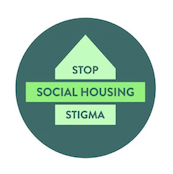Stigma in Social Housing Survey
“We are tenant volunteers. We would like to thank DLUHC (Department of Levelling Up, Housing and Communities) for working with us and their recognition of our work to address social housing stigma.
We are pleased to see the inclusion of addressing stigma in their DLUHC draft Directions to the Regulator of Social Housing on their Conduct and Competency Standard.
We feel our Partnership’s Pledge and Toolkit, to be developed with Durham, and Sheffield Hallam Universities, The Chartered Institute of Housing (CIH) and TPAS, The Tenant Engagement Experts will really help landlords and contractors to work with tenants to help address the wickedness of social housing stigma, locally.
This is your chance to shape its content – please do complete the survey, the result of which will go directly to Durham University. Please also volunteer for some of our England wide Focus groups by volunteering on the survey”
Lynne Brosnan
Chair of Stop Social Housing Stigma National Committee
stopsocialhousingstigma21@gmail.com
We are keen to have your involvement in a survey that will support the social housing sector to make a real difference for residents – in tackling social housing stigma. This survey aims to evaluate the support for the sector so far, in recognising and addressing the stigma that social housing residents experience and highlighted in Stigma and Social Housing in England, Stigma and Social Housing in England: feedback on the consultation responses and “It’s not okay – A guide to tackling stigma in social housing”.
This survey also seeks your thoughts on what useful tools will help to take further action. We hope that your organisation, staff and residents will participate in the plan for action to tackle the stigma, that will follow and build on the information you give in this survey. (More about those opportunities below).
We hope that you will share your valuable experience and insight with us to help further tackle stigma in social housing. This survey will take approximately 20 minutes to complete.
What is the purpose of the study?
The case for addressing social housing stigma is already well-made and appreciated in the Housing Sector. It is not acceptable to treat tenants the way you would not treat your loved ones or to segregate children’s playgrounds on estates from those who have social housing. It is also not acceptable to be unaware of the unconscious bias from assumptions made by otherwise excellent and caring staff who manage social homes. The problem is accelerated by the limited control afforded within growing social media platforms that have opinions about tenants and social housing estates. This feeds opinions which are rarely addressed by more accurate knowledge about their lives. Consequently, we have identified a need to:
· Evaluate the implementation and impact of the recommendations made by the reports on social housing stigma.
· Develop a large publicity campaign to adopt a pledge to address stigma, locally by each landlord, or by area/estate/community. We plan to roll this out across all English social housing.
· A need for practical help for landlords, through a detailed toolkit, which will include, self-assessments; action plans; case studies and policies on how to address stigma locally, which will work across England.
How will we develop these tools to tackle stigma?
We aim to develop and pilot a pledge and a self-assessment toolkit to support landlords to address stigma, with tenants, contractors and other partners. The Toolkit will enable landlords to better understand stigma within their organisations, put in place policies and procedures to effectively challenge stigma, enable organisations to agree action plans with the governing structures within their organisation, support/train staff and evaluate their performance in tackling stigma within their organisation. We plan to develop these tools by
· Conducting and analysing the findings from this survey.
· Organising follow-up focus groups to reflect on the feedback from the survey’s findings.
· Organising policy workshops across the sector and with staff and policymakers.
· Evaluation workshops to share good practices and challenges.
· Publication of case studies to share good and bad practices.
Anticipated Benefit:
We hope that the evaluation of the impacts of the reports, the pledge and the self-assessment toolkit will enable landlords to:
i. better understand the complex experience of stigma and discrimination.
ii. be equipped to identify if/where residents are experiencing stigma.
iii. have tools to put in place effective policies, procedures and plans to effectively address stigma.
v. further enable organisations to agree on action plans within their governing structures.
vi. support/train staff to identify and change organisational practices.
This survey will serve as the first of many steps to drive engagement and policy changes across the sector and organisations.







